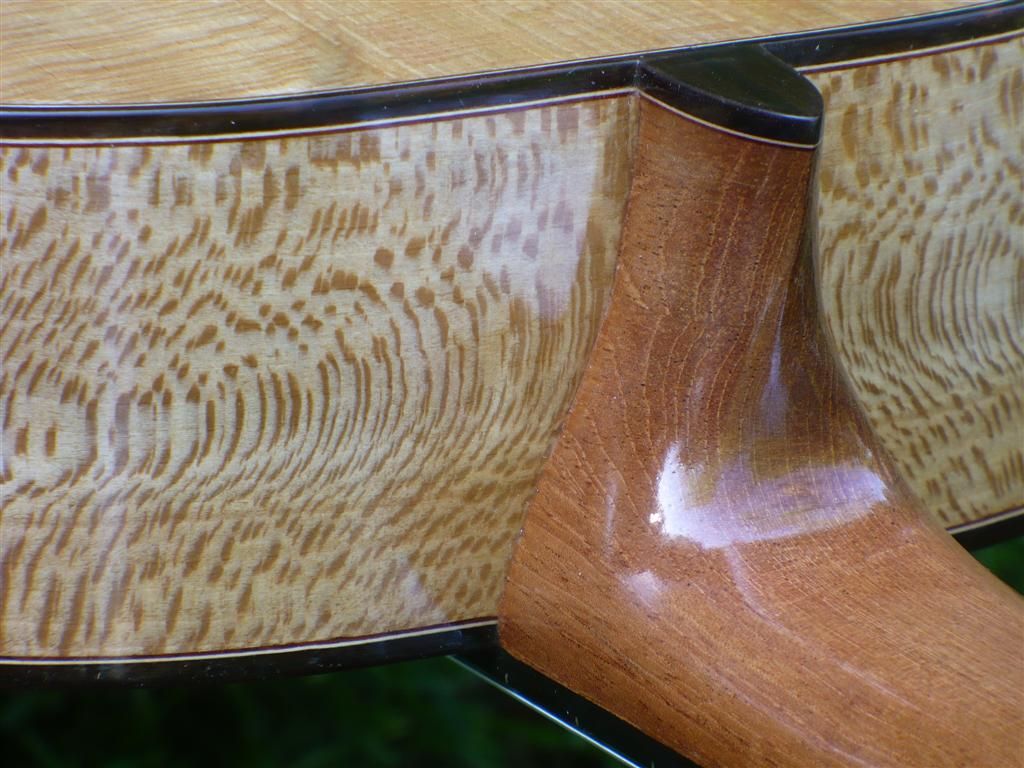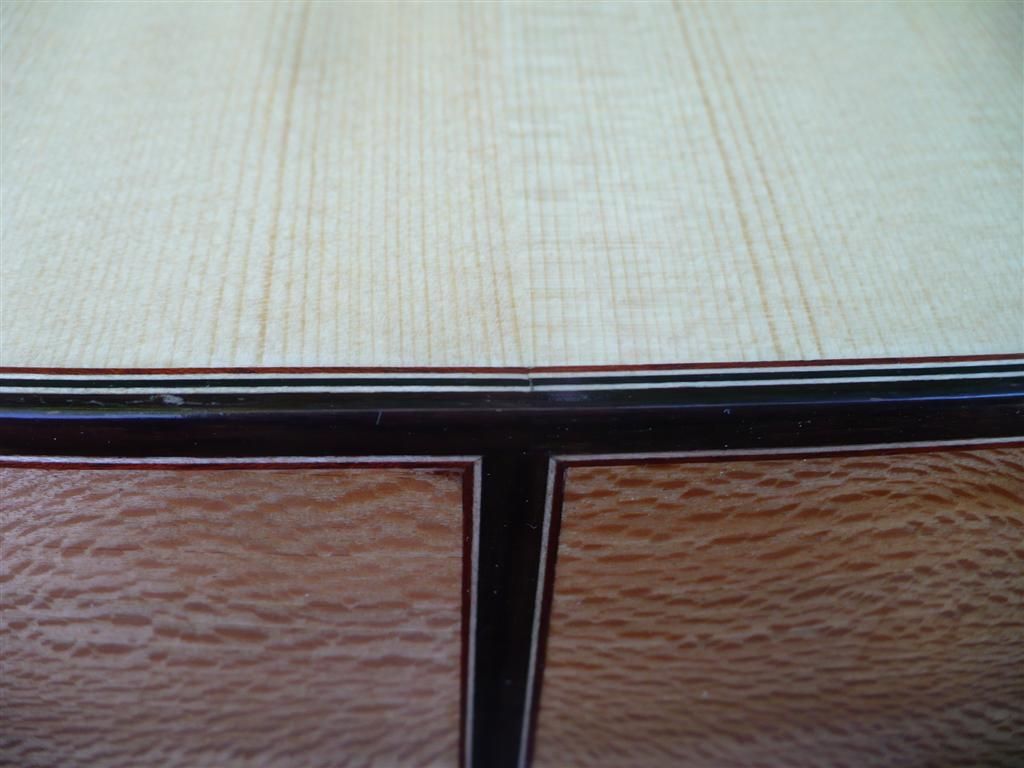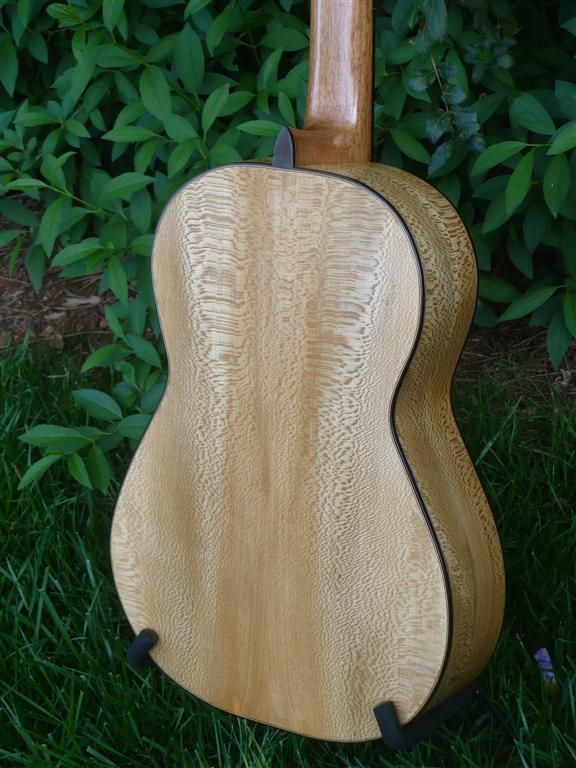
 |
|
#1
|
|||
|
|||
|
Have a May-belle, seems to be all mahogany body, and, uniquely for a guitar, the soundboard is a single piece of mahogany, not two book-end matched pieces joined.
I have stripped it down to barewood, sanded-- so far--- to 220 and going to take it down to 600 and steel wool. Instead of making its appearance primary and doing a French polish on it, I'd like to keep it as close to natural mahogany as possible but protecting it somewhat with the lightest finish I can get away with. I love the sound of the raw wood, but already the oils from my fingers and general handling are starting to darken the top in spots. What can I use? Lemon Oil has been suggested as being very light and will provide some protection. Any better ones that would work? |
|
#2
|
|||
|
|||
|
There are two general classifications of finish: penetrating and surface. Penetrating finishes, as the name implies, soak into and penetrate the fibers of the wood. Surface finishes do not appreciably soak into the wood but, instead, sit on the surface.
Penetrating finishes are essentially impossible to remove once applied. These include oils of any kind - lemon, tung, "Danish", walnut... Once applied, the only way to "remove" them is to sand (or plane) away the impregnated wood. Penetrating finishes provide anywhere from no appreciable protection for the wood to "some". Surface finishes can (relatively) easily be removed once applied. These include shellac (French polish), lacquers, varnishes... Surface finishes, generally, provide significantly more protection for the wood than penetrating finishes, even when applied thinly. So, the first question to ask yourself is do you want to apply an irreversible finish, or one that can potentially be removed? Lemon oil would be just about the last thing I can think of that I would want to use as a finish on any instrument. Non-hardening oils, such as "lemon oil", tend to attract and hold dust and dirt while offering minimal protection. Hardening (catalyzing) oils, such as tung or "Danish" or Tru Oil, will leave a smoother less tacky finish, less prone to attracting dust and dirt. Well applied, they can be quite attractive on woods such as mahogany. If you want to be "historic", lute makers of old used a sizing of egg whites on soundboards. Another option would be to apply a thin paste wax finish. It would give you the "raw" quality, while offering some protection against fingerprints and oils. It could be reapplied as required, or removed if required. Last edited by charles Tauber; 01-19-2013 at 10:59 AM. |
|
#3
|
|||
|
|||
|
French polishing with shellac flakes would be my choice. Never heard anybody complain about the thickness (if you do it right).
__________________
gits: good and plenty chops: snickers |
|
#4
|
|||
|
|||
|
Following with what Charles stated, I would also expect that lemon oil or similar non-drying oil would actually soften the wood over time. A very bad choice, IMHO.
Classical players usually prefer French polished guitars to allow the guitar to vibrate as much as possible. I mentioned in other threads that classical players often (usually?) perform un-amplified, so their requirements for maximum volume are greater than steel string or nylon string players who use amplification. French polish can be applied thin, but since it is alcohol based, you likely don't want to spill your beer on it. Also, I expect the seal coats will sink in deeper than water based finishes due to the thinness of the alcohol, but I have no proof of this. Bruce West, who instructed me for my first guitar build, uses a varnish because he believes it inhibits top vibration less than other finishes. I have used French polish (my main technique) and water based poly finish. Nitro finishes can also be applied very thin by skilled craftsman, although nitro is entirely out of my league and I have no experience applying or repairing nitro. Summing up, I'd recommend you away from an oil based finish and suggest you do FP or nitro. As a last thought, here is a theory I have been toying with... Sound travels more quickly and efficiently (less energy loss) through dense objects compared to non-dense objects. (You can easily get reference charts - take air and water, for example, and you can see a huge difference!!) So, putting a dense finish on a guitar is essentially putting a "sheath or envelope of sonic conductivity" (cool phrase, eh?) on the surface of the guitar. Following, if this sheath is denser than the wood it is sheathing, then the sound energy will travel FASTER through the finish to all areas of the soundboard compared to the slower rate of travel through the wood. So, rather than the finish having a negative net effect on the sound, it may in fact be such that the finish can have a net effect of improved tone. I have NO proof of this, nor am I convinced either way. It is just a theory of a possibility, but it makes sense in some ways. Also, the finish is so thin that very little amount of sound will travel through the finish, so even if there is a net positive effect on the sound, it is likely extremely negligible. Good luck with your decision.
__________________
---- Ned Milburn NSDCC Master Artisan Dartmouth, Nova Scotia |
|
#5
|
|||
|
|||
|
I should also mention I want to apply the finish requiring the least amount of effort, and it looks like the Paste Wax finish is best for a removable, easy to apply finish that won't inhibit sound, or dampen it the least.
FP as I have been reading about, is enormously time consuming and seems to impart little but a very glossy furniture quality finish to the sufrace, which I have no interest in for this guitar. Poly Varnish, H2O based, I am assuming is next best for my purposes? |
|
#6
|
|||
|
|||
|
Quote:
Most nitrocellulose lacquer is applied by spraying either with a compressor/gun or HVLP/gun. It can also be sprayed with an "airless" sprayer, but atomization isn't as good as with the other means. It can also be purchased as an aerosol can (spray bombe). Sprayed nitrocellulose lacquer is FLAMMABLE and must be sprayed out of doors or with suitable indoor ventilation (e.g. spray booth, with precautions for flammability). Essentially, it is an "industrial" finish, not well-suited to the occasional hobbiest. If one sprays it from a can, out of doors, on a low-humidity day, one can get away with it. Mahogany is an open-pored wood. Spraying a high-gloss finish on an unfilled, open-pored wood will excentuate the pores of the wood, often in an unattractive way. A matte or satin would be a better choice for this application. One can also purchase a brushing or padding lacquer, such as made by Deft, that reduces much of the hazard of spraying. (Deft smells terrible, not that sprayed nitrocellulose is exactly pleasant.) Brushing or padding eliminates the need for acquiring spray equipment. If you have no experience with spray application, I'd suggest staying with brushed or padded finishes. Brushed, padded or sprayed, it is possible to apply a very thin finish, if desired. |
|
#7
|
|||
|
|||
|
Quote:
If one is doing a "full" French polish, then, yes, it is time consuming. If one is to use a few thin, "sealer" coats of shellac that are padded on, it is not time consuming. But, that shouldn't be confused with a "full" French polish application. Quote:
I've used this, Minwax Wipe-On Poly, quite successfully on furniture, but not tried it on guitars: http://www.minwax.com/wood-products/...ax-wipeon-poly Perhaps Ned can suggest what he uses. Another "finish" that occurs to me is the Beall Wood Buffing System. I use the buffing wheels in a drill press, mostly, but occasionally in a hand drill. Contrary to the recommendations, I use it without first finishing with a penetrating oil. Then it is simply buffed wax. Looks - and feels - very close to a lacquer finish. I haven't tried it on a guitar body, but expect it would take about an hour or so to do a guitar body. Care would be required not to press too hard on the thin surfaces of the body. http://www.leevalley.com/en/Wood/pag...040,43042&ap=1 |
|
#8
|
||||
|
||||
|
I agree that a pure oil finish would not be a good choice, as most do not ever dry completely. Lemon oil is really more of a cleaning agent for wood and is OK for finger boards, but it doesn't really do anything for it other than clean off some grime.
Most oil finishes - Danish Oil, Tru-Oil, Tung Oil, and others, are not really oil finishes at all. They are varnishes designed to be applied in multiple, very thin, coats with a cloth or a brush. Often they are thought to soak into the wood, and they do, but it's so little that you can sand it off with a high grit paper like 220, so it doesn't soak in very deep. All that said, there are builders out there using oil finishes with great results. Kevin Aram, of some note, a UK classical builder uses, Liberon Finishing Oil, with great results. I know a number who have and do use Tru-Oil with good results. Here is one of my classicals with a full Tru-Oil finish.   
__________________
Waddy |
|
#9
|
|||
|
|||
|
Waddy,
Have you compared the tone of a guitar with a top that's been Tru-Oiled to one that's been FP or lacquered? I've read that oil can dull responsiveness. I've never used T.O. so have no idea how hard it is once cured. Jim McCarthy |
|
#10
|
||||
|
||||
|
I certainly can't tell the difference. I have French polished most of my guitars, and Tru-Oil is equally as transparent as a finish. Kevin Aram, whose guitars are in the 10,000 BP area, uses Liberon as I said, and he believes it's better. Liberon is Tung Oil based and Tru-Oil is Linseed Oil based. Otherwise very similar. Can't say it is a better finish, but it is certainly easy to apply and it is not as reactive to perspiration as French polish is in some cases.
I know you really can't tell from clips, but here is a clip of 10 that was recorded when it was fresh off the bench. "Separation of Soul and Body", O'Carolan played by my friend Johnnie May.
__________________
Waddy |
|
#11
|
|||
|
|||
|
Quote:
Thanks for the information. |
|
#12
|
|||
|
|||
|
If you're using steel wool in your final smoothing, be careful using a water based topcoat. It can cause steel wool fragments left in the wood to rust and stain the wood and finish.
I recently experimented with a finish for furniture where I wanted a natural, almost invisible finish. I did a single coat of 1-1/2 pound cut shellac followed by wax applied with 0000 steel wool. It left a finish that looked great and felt even better. |
|
#13
|
|||
|
|||
|
Equipment:
I have both types of sprayers, which I accidentally acquired. (An old sprayer, a compressor gun, I lent to a friend who returned it in non-working order, i thought was shot. So I bought a HVLP. Turns out only a cleaning, and replacement of a thin film gasket put the old compressor back in shape). I haven't mastered spraying but I think I can do a yeoman's job on the guitar with either one of them. |
|
#14
|
|||
|
|||
|
What kind wax?
|
|
#15
|
|||
|
|||
|
I have an electric buffer so I could buff out the wax more easily than using my drill press.
|